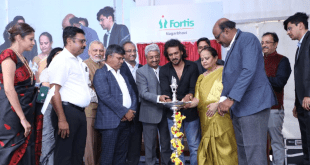~ Extrahepatic portal vein obstruction (EHPVO) with portal hypertension mainly occurs in pediatric patients, is a common cause of upper GI bleeding and requires prompt medical attention~
Mumbai: A team headed By Dr Imran Sheikh, Consultant GI HPB & GI Oncosurgeon, Wockhardt Hospitals, Mira Road successfully treated a 17-year-old boy from Mumbai with massive gastrointestinal bleeding (GI) due to rare liver disorder known as Extrahepatic Portal Vein Obstruction (EHPVO). The patient has resumed college after undergoing a life-saving procedure.
Ishaan Khanna (name changed) *, a resident of Nallasopara is a college student. He Experienced symptoms such as Frequent urination with pain and blood in vomits and cough. He did not try any home remedies. He consulted local doctors but with no improvement he approached Wockhardt Hospital, wherein he got a new lease of life.
Dr Imran Sheikh, Consultant GI HPB & GI Oncosurgeon Wockhardt Hospital, Mira Road said, “On arrival the patient had massive upper GI bleeding and was in a state of shock. He was immediately admitted to PICU, and blood transfusions were given. He had a low platelet count and Hemoglobin. On evaluation, he was found to have Extrahepatic portal vein obstruction (EHPVO) with portal hypertension. It is a vascular disorder of the portal vein, which results in obstruction and cavernomatous transformation of the portal vein with or without the involvement of intrahepatic portal vein, splenic vein, or superior mesenteric vein: This disorder has the blockages in the main vein which carries blood from intestine towards Liver. Due to blockages, there is increase in the back pressure on intestinal vessels which leads to bleeding in vomiting or in stools. It is a common cause of upper GI bleeding. This is the 2nd most common cause . Patients with extrahepatic portal vein obstruction are generally young and belong mostly to Asian countries. The disease is 0.05% – 0.5% common. Most of such cases are managed by Endoscopy and very selective patients require complex surgery.
The patient was scheduled to undergo a life-saving procedure of Endoscopic variceal ligation by Dr Lalit Verma (Consultant Pediatrician and Gastroenterologist) The procedure includes: Endoscopically active bleeding site vessels are ligated using bands. stabilization and taking care of an emergency, the patient subsequently planned for definitive shunt surgery.
Dr Imran Shaikh (Surgical gastroenterology and Hepato-pancreato-Biliary surgeon) performed surgery called Splenectomy with proximal Splenorenal Shunt (PSRS) & limited Gastroesophageal devascularization “During this surgery, the spleen was removed, and the proximal splenic vein was joined to the right adrenal vein which subsequently will drain to the left renal vein. The surgery was uneventful, and the patient recovered well. Now, the patient will be saved from a future catastrophe like recurrent bleeding, hyper splenism (Low Hemoglobin, Low platelet count & Low WBC) and portal biliopathy (Dilated blood vessels into bile duct leading to jaundice). The procedure lasted for 6 hours, and he was discharged within a week. Not treating him at the right time could have led to complications such as respiratory distress, heart attack or even death. Precautions advised are to keep him on Anticoagulants.
“I panicked when I noticed symptoms such as: Frequent urination with pain and blood in vomits and cough. Which interfered with my daily routine. My world came crashing down after the diagnosis of EHPVO and GI bleeding. But I was fortunate to receive timely treatment at Wockhardt Hospital. I have recovered and will resume college soon,” concluded Ishaan Khanna (name changed) *.
 Newspatrolling.com News cum Content Syndication Portal Online
Newspatrolling.com News cum Content Syndication Portal Online






